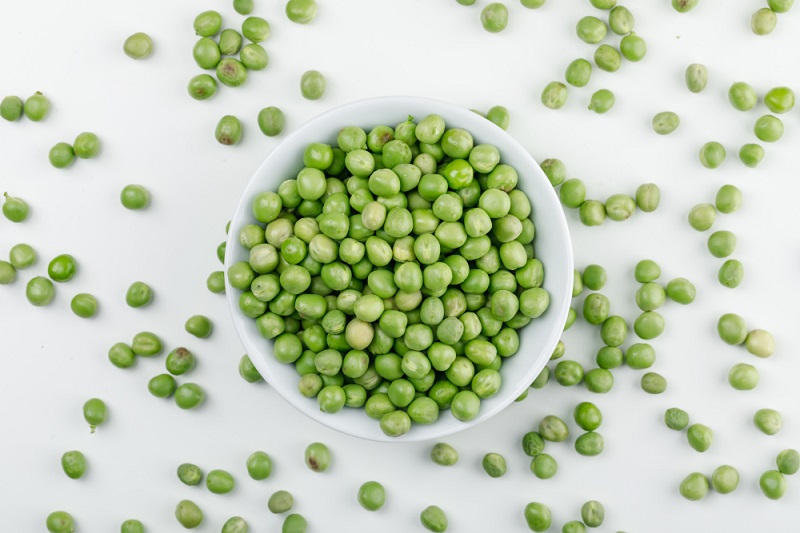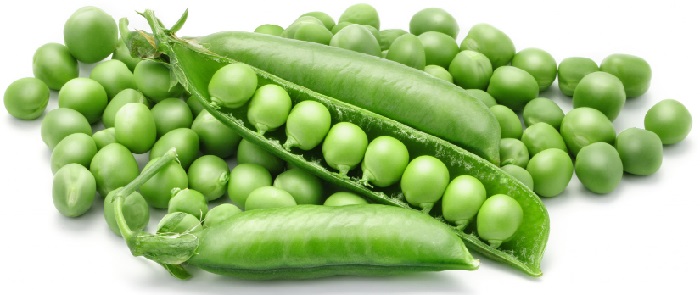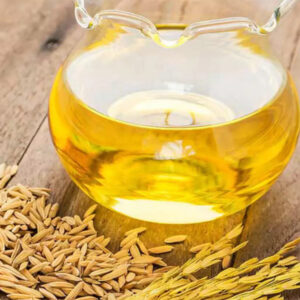Green peas, those humble spheres of vibrant green goodness, may appear unassuming, but their nutritional profile packs a powerful punch. Often overlooked in favour of more glamorous superfoods, green peas deserve recognition for their myriad health benefits and versatility in the culinary world. Let’s delve into the remarkable advantages that these petite legumes bring to the table.
Health Benefits of Eating Green Peas:
Discover the myriad benefits of incorporating green peas into your diet. From providing essential nutrients like vitamins and minerals to supporting digestive health and offering plant-based protein, green peas are a versatile and nutritious addition to any meal plan.
1. Rich Source of Vitamins and Minerals:
Despite their small size, green peas are densely packed with essential vitamins and minerals. They are particularly rich in:
- Vitamin K: Vital for blood clotting and bone health.
- Vitamin C: An antioxidant that supports immune function and collagen production.
- Vitamin A: Important for vision, skin health, and immune function.
- B Vitamins: Including folate, thiamine, and riboflavin, crucial for energy metabolism and nervous system function.
- Minerals: Such as iron, magnesium, potassium, and zinc, which play roles in various bodily functions including oxygen transport, muscle function, and immune support.
2. High Fiber Content for Digestive Health:
Green peas are an excellent source of dietary fibre, both soluble and insoluble. This fibre content aids in:
- Digestive Regularity: Fiber adds bulk to stool, promoting regular bowel movements and preventing constipation.
- Gut Health: Fiber acts as a prebiotic, nourishing beneficial gut bacteria and supporting a healthy microbiome.
- Blood Sugar Control: Soluble fibre slows down the absorption of sugar, helping to stabilize blood glucose levels and reducing the risk of insulin spikes.
3. Plant-Based Protein Powerhouse:
For those seeking plant-based protein sources, green peas are a standout option. They offer a substantial protein content, making them an excellent choice for vegetarians, vegans, and anyone looking to reduce their reliance on animal products. Protein is essential for:
- Muscle Repair and Growth: Amino acids from protein are the building blocks for muscle tissue and are necessary for repairing and maintaining muscle mass.
- Satiety: Protein-rich foods help to promote feelings of fullness and satiety, which can aid in weight management and control hunger cravings.
- Metabolic Health: Protein plays a role in various metabolic processes, including hormone production, enzyme function, and immune support.
4. Antioxidant and Anti-Inflammatory Properties:
Green peas contain a range of antioxidants, including flavonoids and carotenoids, which help to combat oxidative stress and inflammation in the body. These antioxidants contribute to:
- Reduced Risk of Chronic Disease: By neutralizing free radicals, antioxidants help to protect cells from damage and reduce the risk of chronic diseases such as heart disease, cancer, and diabetes.
- Anti-Inflammatory Effects: Certain compounds in green peas have been found to possess anti-inflammatory properties, which may help to alleviate inflammation-related conditions such as arthritis and inflammatory bowel disease.
5. Versatile and Convenient:
One of the most appealing aspects of green peas is their versatility in the kitchen. Whether fresh, frozen, or canned, green peas can be incorporated into a wide range of dishes, including soups, salads, stir-fries, casseroles, and pasta dishes. Their mild flavour and tender texture make them a welcome addition to both savoury and sweet recipes.
In summary, green peas are a nutritional powerhouse, offering an array of health benefits ranging from digestive support to immune function and beyond. With their abundance of vitamins, minerals, fibre, and protein, green peas prove that good things do come in small packages. So, the next time you’re planning your meals, don’t overlook these vibrant green gems—your body will thank you for it!
FAQs:
1. What are Green Peas?
Green peas, scientifically known as Pisum sativum, are a type of legume that belongs to the Fabaceae family. These small, spherical seeds are typically harvested from pods and are widely consumed across the globe, either fresh, frozen, or canned.
2. What Nutrients Do Green Peas Offer?
Despite their diminutive size, green peas are a powerhouse of essential nutrients. They are rich in dietary fibre, protein, vitamins (such as vitamin K, vitamin C, and various B vitamins), and minerals (including iron, magnesium, potassium, and zinc). Additionally, they are low in fat and calories, making them a nutrient-dense addition to any diet.
3. How Do Green Peas Benefit Health?
- Promoting Heart Health: The high fibre content in green peas aids in reducing cholesterol levels, thus lowering the risk of heart disease. Furthermore, their potassium content helps regulate blood pressure, promoting cardiovascular well-being.
- Boosting Digestive Health: With their generous fibre content, green peas support digestive health by preventing constipation and promoting regular bowel movements.
- Enhancing Immunity: Loaded with vitamin C and other antioxidants, green peas bolster the immune system, helping the body fend off infections and illnesses.
- Supporting Weight Management: Despite their starchy nature, green peas are relatively low in calories and fat. Their fibre and protein content contributes to satiety, helping control appetite and manage weight.
- Providing Energy: Green peas are a good source of carbohydrates, which serve as the body’s primary energy source. Including them in meals can help sustain energy levels throughout the day.
4. Are Green Peas Suitable for Everyone?
Green peas are generally safe for consumption for most individuals. However, those with specific dietary restrictions, such as individuals following a low-carbohydrate or ketogenic diet, may need to moderate their intake due to the carbohydrate content of peas.
Additionally, individuals with certain medical conditions, such as irritable bowel syndrome (IBS) or other gastrointestinal issues, should monitor their consumption of peas, as the fibre content may exacerbate symptoms in some cases.
5. How Can Green Peas Be Incorporated into the Diet?
There are countless ways to enjoy the nutritional benefits of green peas:
- Incorporate them into salads: Add fresh or blanched green peas to salads for an extra burst of flavour and nutrition.
- Blend them into soups: Puree green peas to create creamy soups or add them whole for texture and colour.
- Use them in stir-fries: Toss green peas into stir-fries along with other vegetables, proteins, and sauces for a quick and nutritious meal.
- Blend into dips or spreads: Create vibrant green pea dips or spreads by blending them with herbs, spices, and other ingredients.
- Pair with grains: Mix cooked green peas into rice, quinoa, or other grains for a complete and satisfying meal.
6. Are Frozen Peas as Nutritious as Fresh Peas?
Yes, frozen peas are generally as nutritious as fresh peas. Frozen peas are often flash-frozen shortly after harvesting, preserving their nutritional content. This makes them a convenient and accessible option year-round, especially when fresh peas are out of season.
7. Can Green Peas Cause Allergic Reactions?
While allergic reactions to green peas are rare, individuals with a legume allergy may be at risk. Symptoms of an allergic reaction to peas may include hives, itching, swelling, difficulty breathing, and digestive discomfort. If you suspect an allergy to green peas, consult a healthcare professional for proper diagnosis and management.






